Hi Tracy and thanks for inviting me to your blog.
I’m an author with two books for adults published so far – Charity’s Child and Low Tide, Lunan Bay.
Coping with Chloe is my first book for younger people – due out on March 21st and aimed at the younger end of the YA market (11+, very roughly speaking).
I grew up in West Yorkshire, lived in Edinburgh for twenty years and now live in Coventry. I used to be a university lecturer and researcher in cognitive science. I have two grown-up children and I have wanted to write all my life. I made sporadic attempts at it when I was younger but finally got down to doing it seriously when I took early retirement in 2006.
I’m really not quite sure. The trigger was that I was going to the Winchester Writers’ Conference and I wanted to enter some of their competitions. I can't remember why, but I decided to have a go at one which asked for the first 500 words and synopsis of a children’s novel. As I jotted down ideas, the voice of Anna (the heroine of ‘Coping with Chloe’) came into my head and started telling me about her twin sister, Chloe. All I could do was write down what she said. I know this probably sounds fanciful, but it really did feel like that. I had no idea, when I started, what the plot was going to be.
Blog: tall tales & short stories (Login to Add to MyJacketFlap)
JacketFlap tags: Writing Advice, Editor Interview, Editor Comments, Publisher interview, Senior Commissioning Editor, Add a tag
In the final post of Strident Publishing Month, tall tales & short stories talks to Strident Publishing’s Managing Director, Keith Charters and Commissioning Editor, Graham Watson.
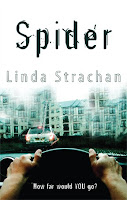
Strident Publishing is the publisher of several award winning books including, most recently, Linda Strachan's Spider.
Spider won the 2010 Catalyst Award. The winner is voted for by teenage readers and Spider was chosen as The Book of the Year 2010.
Keith and Graham, welcome to tall tales & short stories and thank you for agreeing to be interviewed.
I’m the Commissioning Editor of Strident. I’ve been in the book trade since I was a teenager and have been involved in every part of the process from commissioning books in publishing houses to selling them over the counter in bookstores. All my heroes were writers, so being an editor is pretty much a dream fulfilled.
It’s to do with history. Before I became a publisher I was an author ( and I still am). And before that I worked in business, running parts of other people’s companies. I always knew that one day I would set up my own business, it was simply a question of what.
By the time my first LEE novel (Lee and the Consul Mutants) was published I had alread
Blog: tall tales & short stories (Login to Add to MyJacketFlap)
JacketFlap tags: Writing Advice, Author Interview, Book trailer, book recommendation, Editor Comments, Agent Comments, Writing Horror, Add a tag
Hi William and welcome.
Would you like to tell us a bit about yourself?
All that follows is true, I swear…
I was born the son of a fairground showman. For the first year of my life, my family and I travelled the southern byroads of England, pitching up on town greens with helter-skelters, ghost trains, waltzers, sideshows and the infamous ‘Wall of Death’ (an almost vertical circular track around which a motorcyclist would hurtle at phenomenal speeds). When I was still in nappies (‘diapers’ to our American cousins), we settled in the seaside town of Skegness. ‘Skeggy’, as it is known to the locals, is famed for its ‘bracing’ offshore winds – which basically means it’s bloomin’ windy up here! Anyway, the Husseys may have stopped travelling, but we were still fairground people at heart and so, during the school holidays, I helped out on my uncle’s infamous ghost train ride – the scariest spookhouse on the East Coast!
At school, I was always a fairly average student – rubbish at maths and science but pretty good at English. It was only when I went to secondary school that my grades started to improve. It was all down to an amazing English teacher – Mrs Breeds – who inspired me to read and write my own stories.
I went on to study Law at university. Why, oh why, did I study Law?! Not got the foggiest. Just seemed a good idea at the time. What I really wanted to do was write. But I always felt that writers were these mythical, god-like beings that lived in a kind of literary Olympus: powerful, unknowable, untouchable. How could a mere mortal such as I aspire to such divinity? Of course, now I know better. We writers are the least god-like and the most human of, well, humans. Prick us and we bleed. Wrong us (like with a bad review) and we’ll revenge! Or, more likely, mope about the house for a bit filled with loathing and self-doubt! Hmm, seem to be going off on a tangent there…
Eventually, after pursuing a half-hearted legal career, I started a Masters Degree in Creative Writing at Sheffield Hallam University, bagged myself an agent pretty soon afterwards, and embarked on the life of a writer of horror stories. Last year, after being challenged by my bookseller friend Deborah Chaffey to write a horror series for kids, I sat down and penned the first Witchfinder book. It was a revelation. Witchfinder is the most fun I’ve ever had as a writer.
What inspired you to write WITCHFINDER: DAWN OF THE DEMONTIDE?
As I say, it all began with Deborah. She’s absolutely committed to children’s fiction and basically threw down the gauntlet. I’d had a couple of adult horror books published by this time (Through a Glass, Darkly (2008) and The Absence (2009)) – now Debs set the challenge to write a genuinely exciting, spooky, inventive and mysterious horror book for kids. For one of my earlier books I’d done some research into the history of the 1
Blog: The Spectacle (Login to Add to MyJacketFlap)
JacketFlap tags: Uncategorized, fantasy, conference, editor comments, Add a tag
 I attended the SCBWI Midwinter Conference in New York this past weekend, including a session on writing fantasy by Disney/Hyperion senior editor Ari Lewin. About four-fifths of her current list is fantasy, and she noted that three quarters of a B&N Top 20 list were, too.
I attended the SCBWI Midwinter Conference in New York this past weekend, including a session on writing fantasy by Disney/Hyperion senior editor Ari Lewin. About four-fifths of her current list is fantasy, and she noted that three quarters of a B&N Top 20 list were, too.
When it comes to subgenres, she sees the most of these, which she defined and gave examples for:
- High fantasy
- Steampunk
- Urban fantasy (simply set in a city, e.g., work by Holly Black and Cassandra Clare)
- Paranormal romance (A lot of the books Ari is currently working on fit this category)
- Dystopian (the only one she did not try to define, but she noted THE HUNGER GAMES, FEED, and THE FOREST OF HANDS AND TEETH as examples.)
She said that although fantasy is doing well, she has to be more selective than ever. She emphasized that a successful fantasy is still fiction, and must have all the elements of good fiction, including an interesting premise, a workable plot, good characters, stakes that matter, etc. World building is not enough.
Two problems she sometimes encounters in manuscripts from new authors:
- What she called “fantasy spaghetti” — too many ideas, too many fantasy elements thrown in, as though the author was tossing in all the cool things they could think of, instead of deciding which best suit this world, this story, this book.
- Trying to start the action and story itself too fast. She suggested giving readers a chance to figure out what’s going on before the main hook or plot begins — not using expository description but letting the scene and the world unfold. As an example, she read a bit of the first story in BLACK JUICE by Margo Lanagan. It certainly made me want to buy that book.
You can read more about this session and many others at the conference blog.
![]() — Joni, who would like to eat (but not read) a big bowl of fantasy spaghetti
— Joni, who would like to eat (but not read) a big bowl of fantasy spaghetti



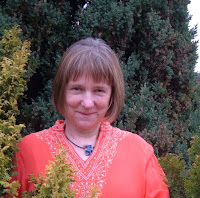
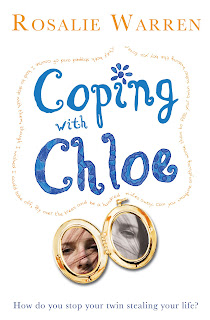



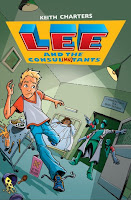

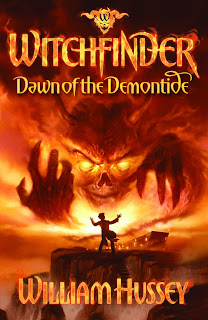

Thank you for this, Tracy. I read Chloe and absolutely loved it. It's been a real treat to watch this novel's progress via an online writing site and I'm delighted for RW that hard work and dreams do sometimes come to fruition
Great interview Tracy. It's so refreshing to hear a writer with so many ideas and projects in mind. Coping With Chloe sound like a brilliant idea and I wish Rosalie all the best of luck with it and the sequels to follow.
I'm really intrigued by the concept of the sci-fi novel too especially the mention of the experimental structure. Looks like a busy time ahead for a writer who deserves the recognition.
Thanks, Tony.
http://anthonycowin.blogspot.com/